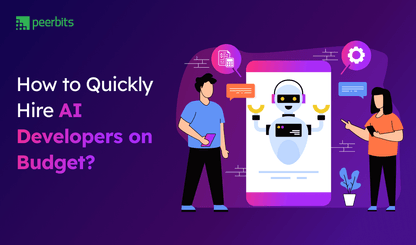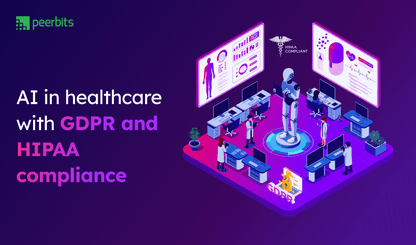When your passengers expect instant booking and real-time updates, your booking system can’t afford to slow them down. For many taxi businesses, this friction quietly costs rides. In some cases, up to 40% of users drop off before completing a booking.
Well this might seem just a tech issue. But, it is a gap that affects the business directly.
With rising user expectations and shrinking attention spans, more ride-hailing businesses are switching to AI chatbots for WhatsApp. Not as an add-on, but as a core part of their booking flow. Why? Because it removes the hassle of apps, account logins, and overloaded support teams. Everything happens within a familiar chat window.
In this blog, we’ll explore how our Ai chatbot development services built an AI WhatsApp chatbot for taxi booking that increased booking completion rates, reduced support load, and powered fast, real-time booking flows.
What was slowing down bookings before the chatbot
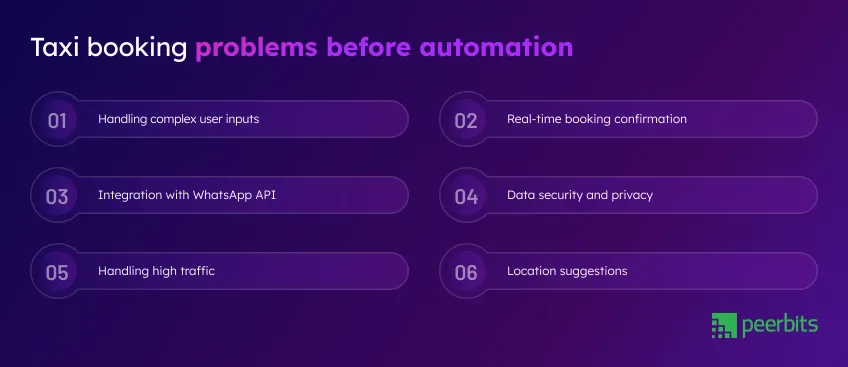
Handling complex user inputs
Manual form entries often led to misspelled or vague addresses. Without NLP for taxi booking system, the system couldn’t understand or validate natural inputs, causing failed or inaccurate bookings.
This led to a drop-off rate of 20 to 40%, especially when users abandoned the booking after repeated input errors.
Real-time booking confirmation
Delayed availability checks and payment status updates. There was no real-time sync, so customers experienced lag between request and confirmation.
Post-chatbot, confirmations now happen in under 1.5 seconds, making the entire ride-booking automation with WhatsApp much faster and smoother.
Integration with WhatsApp API
The team faced challenges in integrating with the WhatsApp Business API. Compliance rules, template restrictions, and message rate limits made it difficult to maintain a consistent and real-time user experience.
These issues slowed down communication and limited the scalability of their WhatsApp-based booking flow. The final solution resolved this by aligning with WhatsApp API integration for taxi standards and optimizing message logic.
Data security and privacy
Sensitive information like pickup points and payments was not well protected. Without secure architecture, the platform posed risks in terms of data privacy in chatbot systems.
The final implementation introduced encrypted data flow, secure API tokens, and protected webhook logic.
Handling high traffic
The system wasn’t built to scale. During peak booking hours, the backend slowed down or dropped requests, limiting business growth.
The new AI-powered booking system handled high volume traffic with an average API response time under 2.5 seconds.
Location suggestions
The booking process lacked a mechanism to help users pick accurate pickup and drop-off points. Without auto-suggestions or validation, unclear locations often led to booking mistakes or delays.
By introducing smart location suggestions through WhatsApp chatbot, booking errors dropped by up to 50 %. These challenges pointed to the need for the best AI chatbot platform built for real-time ride booking.
What Peerbits built: AI WhatsApp chatbot for taxi booking
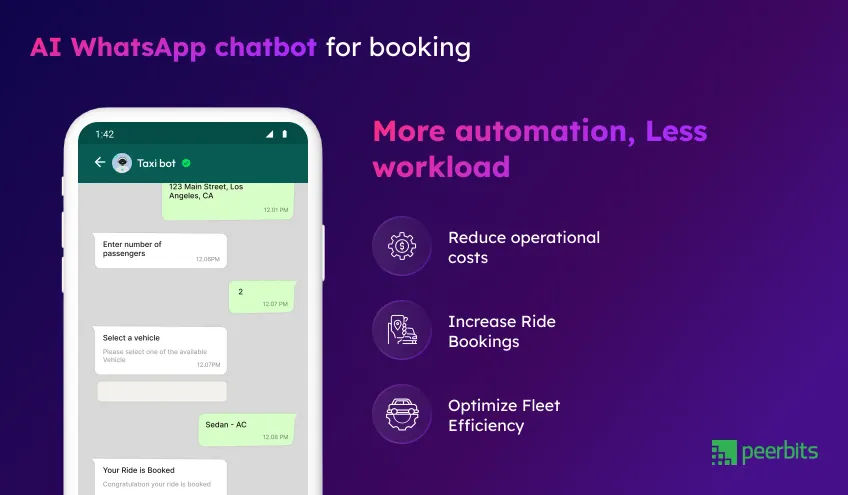
Peerbits an AI development company engineered a complete AI WhatsApp chatbot for taxi booking, designed to simplify the ride-booking process and remove the process-level issues the client was dealing with. The system was an entire booking engine operating inside WhatsApp, with backend automation, official API integration, and real-time performance.
WhatsApp-first ride booking without app dependencies
The new system allowed users to book a taxi directly on WhatsApp. They could select the vehicle type, set pickup and drop locations, and confirm rides, all through a conversational interface.
There was no need to download an app or learn a new platform. This change shortened the booking journey drastically. As a result, the booking completion rate increased by 20 to 30 percent, compared to the older app-based process.
Smart input handling using NLP for taxi booking system
The chatbot was powered by NLP, making it capable of understanding fuzzy or incomplete messages like “pickup from airport” or “drop at mall gate.” This was a major upgrade from traditional bots with fixed button-based responses.
It offered auto-suggestions for common locations and allowed live location sharing. These features directly reduced manual input errors and confusion during dispatch. The solution acted as a real-time taxi booking chatbot, not a basic menu bot.
Fast, real-time booking using webhooks
The backend architecture used webhooks to handle booking logic in real time. Each user action like fare confirmation, ride scheduling, or driver updates, triggered a fast response between the chatbot and the core booking engine.
Key actions like booking confirmation and invoice generation were completed in under 1.5 seconds. The average API response time stayed below 2.5 seconds, even during peak usage. This real-time communication helped deliver a smooth experience for both users and support staff.
- Booking confirmation and invoice generation: Completed in under 1.5 seconds, even during busy hours.
- API response time: Maintained an average of below 2.5 seconds, ensuring quick backend processing.
- Real-time sync: Faster communication between users and support, reducing delays and errors.
Peerbits delivered a high-performance AI-powered booking system that turned WhatsApp into a fully operational ride-booking channel. It was not just about convenience, it solved multiple pain points across booking, support, and operations in one clean flow.
Key features that made the chatbot successful
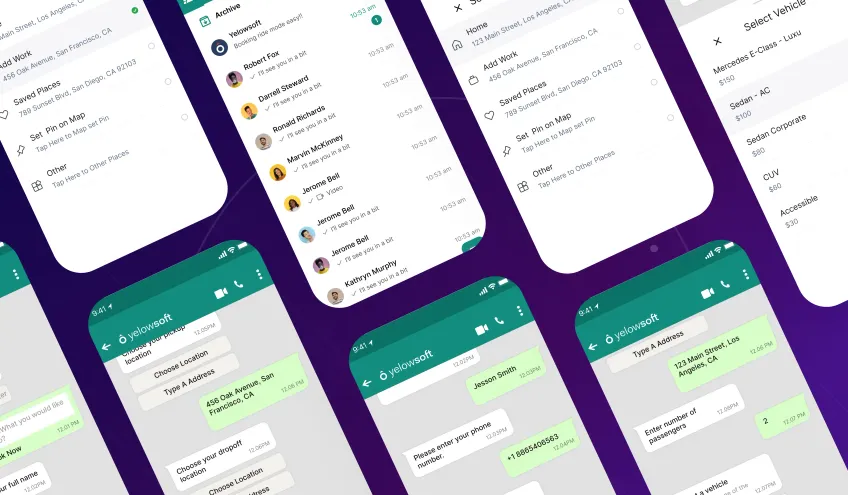
Building a WhatsApp chatbot is one thing making it work in a high-demand taxi environment is another. What Peerbits delivered was a tightly built solution with features designed to reduce effort, prevent failures, and support the business at scale. Each element had a clear function, and most importantly, a measurable impact.
Here’s a breakdown of the features and what made them work.
| Feature | What it solved |
|---|---|
| Conversational ride booking | Users interact in a natural, chat-based format. The chatbot guides them step by step through the booking process with clear prompts. |
| Multi-step booking flow | The chatbot collects essential ride details in sequence. This includes the user's name, pickup and drop-off locations, number of passengers, vehicle type, and payment method. |
| Real-time updates | Booking confirmations and ride status updates are delivered instantly through WhatsApp. This ensures users stay informed without delay. |
| User-friendly interface | Riders only need a WhatsApp account to use the service. There is no need for extra downloads or complex app navigation. |
Impact of the WhatsApp chatbot solution
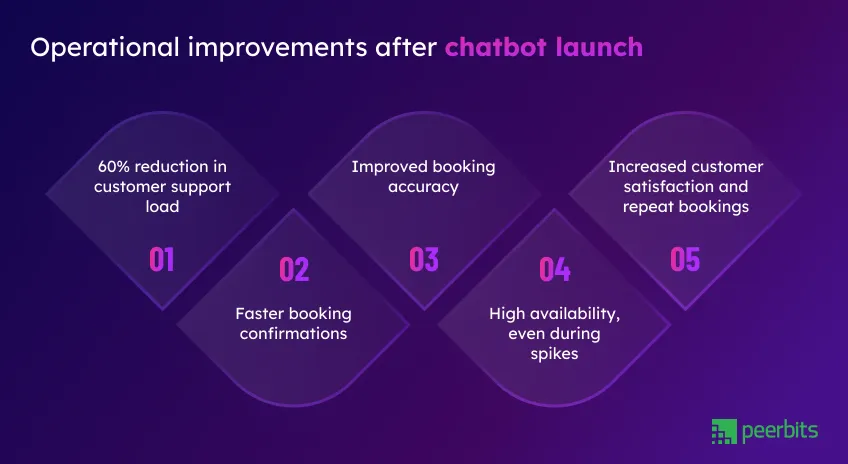
After going live, the AI WhatsApp chatbot for taxi booking made a visible difference across operations, user engagement, and team efficiency. Every feature translates into tangible improvements, both for the business and for end users.
60% reduction in customer support load
The chatbot took over common queries like booking status, payment updates, and pickup issues. These routine tasks no longer needed human agents.
Support teams saved between 2 to 4 hours per day per agent, which reduced overhead and let them focus on more complex issues.
Bookings confirmed in less than 1.5 seconds
Users received immediate replies during the booking process. Fare details, ride updates, and driver assignments were all handled in real time.
This speed helped reduce abandonment. With each booking confirmed in under 1.5 seconds, completion rates saw a visible lift.
20–40% drop-off rate improvement post-implementation
Auto-suggestions and intelligent input handling reduced manual errors. Pickups were more accurate, and users didn't need to type perfect addresses.
Dispatch mistakes dropped. The system's NLP for taxi booking worked quietly in the background to make every ride more reliable.
99.95% uptime during peak traffic hours
The backend stayed stable even during peak booking hours. No failed rides, no slowdowns.
With 99.95% uptime, the system was trusted to perform under load, without the crashes seen in older setups.
20–30% increase in booking completion rate
The overall experience felt smooth. No app downloads, no delays, and a fast booking flow made the service more dependable.
User satisfaction scores improved. The client saw a rise in repeat bookings and higher NPS within the first few weeks of launch.
How this WhatsApp chatbot fits other industries?
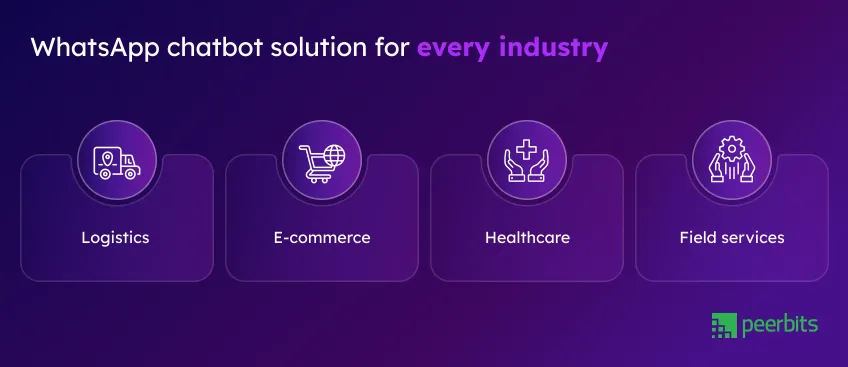
The WhatsApp chatbot system Peerbits delivered wasn’t limited to ride-hailing. It was built on a flexible architecture that fits any use case where fast responses, live updates, and customer interactions happen in real time.
This same logic, supported by a chatbot-first interface and backend automation, can drive measurable outcomes across industries like logistics, e-commerce, healthcare, and field services.
Businesses aiming to improve workflows and reduce support load can see clear AI chatbot ROI when applied to the right use case.
Logistics: Live parcel tracking and delivery updates without manual calls
Logistics teams often face repeated questions about delivery times, tracking status, or address changes. These tasks overload support staff and delay resolutions.
By adapting the same WhatsApp chatbot development approach, customers can track parcels, confirm delivery windows, or fix incorrect addresses instantly. The webhook-driven backend keeps updates accurate and live, reducing failed deliveries and cutting down on missed SLAs.
E-commerce: Reducing post-order support with real-time confirmations
Online shoppers expect instant confirmations, payment receipts, and live tracking links. Most e-commerce platforms struggle to provide that without overloading their support teams.
This chatbot model helps automate all post-order conversations. From sending receipts to confirming dispatch status, the system reduces confusion and builds buyer trust. Just like in the taxi use case, the same backend logic generates instant PDF invoices and status updates via WhatsApp.
Healthcare: Simplifying appointment booking and reminders
Clinics and hospitals face constant demand for appointment bookings and availability checks. Manual systems are slow, and call queues often lead to drop-offs.
This solution can automate appointment scheduling and send timely reminders, all through WhatsApp. With AI chatbots for WhatsApp, patients can interact using simple messages like “book an eye checkup this Friday,” and the system can guide them through time slots, confirmations, and even payment steps.
Field services: Dispatch coordination and real-time job updates
Businesses with on-ground technicians often face delays due to poor coordination. Missed appointments or unclear instructions lower service quality.
Using the same AI WhatsApp chatbot solution, companies can automate job assignments, live status sharing, and completion confirmations. Whether it's appliance repairs or inspection visits, the flow mirrors taxi dispatch but is fully adapted to field service logic.
This chatbot model isn't tied to taxis. It's a reusable framework for automating conversations, speeding up service, and reducing human workload, across any industry that handles live customer operations at scale.
Peerbits can adapt this to fit your specific process, whether it’s bookings, AI chatbots for customer service, logistics, or scheduling.
Conclusion
For taxi businesses, speed, accuracy, and customer convenience are non-negotiable. This case showed that a well-executed AI chatbot for WhatsApp for taxi booking can manage ride requests, payment updates, customer queries, and more, all within a familiar chat interface.
The improvements were clear. Faster booking confirmations, reduced manual errors, high system uptime, and a 60% drop in support workload. The solution didn't just solve technical issues. It made the entire booking experience smoother for both users and the business.
Peerbits delivered more than a chatbot. We built a real-time AI chatbot for bookings system that worked in day-to-day operations. It handled peak-hour traffic, reduced dispatch delays, and improved customer satisfaction from the first week of launch.
If you're planning to build a similar system or want to upgrade your booking flow using AI chatbot development services, we’re ready to help. From design to deployment, our team can build what your operations need.

FAQs
We use the official API with encryption, verified templates, and secure backends to protect data privacy in chatbots and transactions.
Yes. It supports API or webhook integrations for real-time updates with legacy or custom systems.
A basic version takes 3–5 weeks. More complex setups may take 6–10 weeks, including testing.
Yes. The chatbot can detect language and respond in multiple languages using NLP.
Fallback options like SMS, email alerts, or a web interface can be activated to maintain service.
Yes. We can build a separate flow for drivers to manage shifts, availability, and ride updates.
No. A simple dashboard lets your team handle updates, monitor chats, and push messages, no coding needed.


